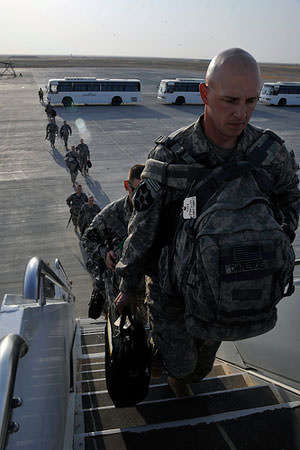The Ambiguity of War’s End
Now that the Iraq war is over -- for U.S. combat troops, at least -- only one thing is clear about the outcome: We didn't win.
Now that the Iraq war is over — for U.S. combat troops, at least — only one thing is clear about the outcome: We didn’t win.
We didn’t lose, either, in the sense of being defeated. But wars no longer end with surrender ceremonies and ticker-tape parades. They end in a fog of ambiguity, and it’s easier to discern what’s been sacrificed than what’s been gained. So it is after seven years of fighting in Iraq, and so it will be after at least 10 years — probably more, before we’re done — in Afghanistan.
George W. Bush elected to send U.S. forces to invade and occupy Iraq, even though there was no urgent reason to do so. I won’t rehash all the arguments about what was suspected, reported or “confirmed” about the nonexistent weapons of mass destruction that provided the Bush administration’s justification for war. But even if Bush and his aides believed in their hearts that Saddam Hussein was actively seeking to develop nuclear, chemical or biological weapons, they had no reason to believe that the United States or its allies faced an imminent or even proximate threat.
They saw the opportunity not just to depose a heinous despot but to reshape the Middle East by implanting a pro-Western democracy at its heart. They succeeded at the former but not the latter.
The war was on its way toward becoming a disastrous failure until the country’s Sunni minority turned against the al-Qaida jihadists who had flooded into Iraq to fight against the hated Americans — and Bush’s troop surge, ably led by Gen. David Petraeus, capitalized on this shift of allegiance. As a result, Iraq did not disintegrate into the vast charnel house of sectarian bloodshed that many had predicted. But neither did it become a coherent, functioning polity — months after the most recent election, a new government still has not been formed — nor did the violence end. Insurgents still periodically wreak havoc, as they did last week in a series of coordinated attacks.
One thing that has not changed about wars is that they always have unintended consequences. In the case of Iraq, the biggest unforeseen development is that Iran has gained tremendous power and influence in the region — and is much closer to becoming a nuclear power. Show of hands: Who believes the Middle East is a safer place now than before the U.S. invasion?
Estimates are that at least 100,000 Iraqis, and perhaps many more, have died as a result of the conflict. Thus far, 4,416 U.S. military personnel have been killed and more than 30,000 wounded. Estimates of the total cost of the war range as high as $700 billion.
Yet, Saddam is dead and gone and there is an elected national government, of sorts, in Baghdad. Under U.S. tutelage, Iraqi security forces have built enough capacity to keep a modicum of order in most of the country. No, we didn’t lose, but we can’t claim victory either.
That will be the epitaph of the war in Afghanistan, too. Already it is clear that President Obama’s pledge to begin a withdrawal next July is not intended to mark the end of combat. This invasion had the aim of destroying al-Qaida’s base of operations, along with the Taliban regime that sheltered the terrorists. American and allied forces achieved success in short order — yet here we are, nine years later, still at war.
Obama is trying a troop surge of his own, having tripled the number of U.S. military personnel in the country since he took office. The truth is, though, that while we were able to leave an Iraq that is held together by duct tape and baling wire, it would take monumental effort — and a lot of luck — to be able to get Afghanistan to that condition. Given the country’s extreme backwardness and corruption, it is inevitable that we will leave behind a mess.
Just as we’ve left the future of Iraq to the Iraqis, in the end we’ll leave the future of Afghanistan to the Afghans. Does anyone believe otherwise? If not, then how many more Americans must die before we accept the ambiguous result — we won’t really lose, but we won’t really win — that we know looms in the fog?
Eugene Robinson’s e-mail address is eugenerobinson(at)washpost.com.
© 2010, Washington Post Writers Group
Your support matters…Independent journalism is under threat and overshadowed by heavily funded mainstream media.
You can help level the playing field. Become a member.
Your tax-deductible contribution keeps us digging beneath the headlines to give you thought-provoking, investigative reporting and analysis that unearths what's really happening- without compromise.
Give today to support our courageous, independent journalists.






You need to be a supporter to comment.
There are currently no responses to this article.
Be the first to respond.